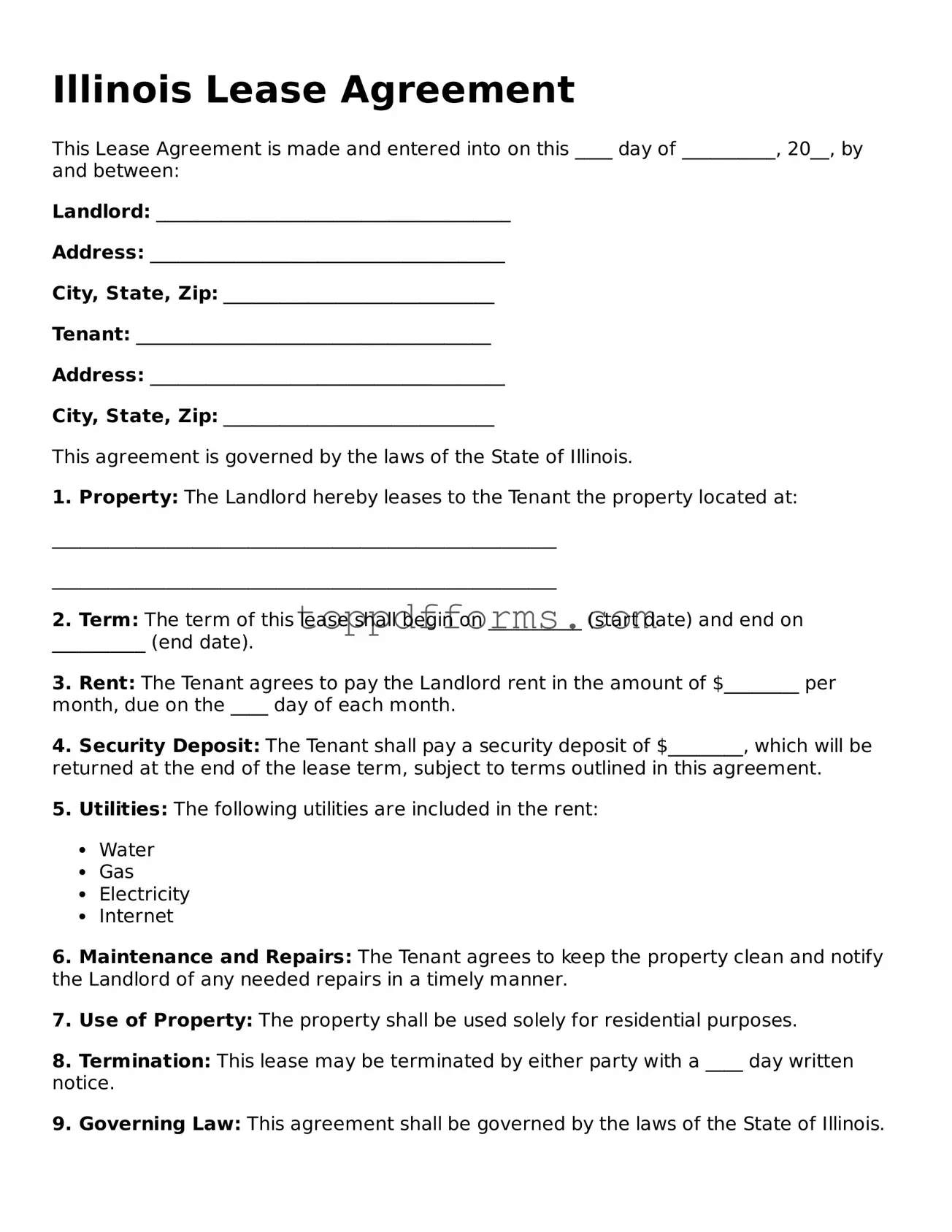Lease Agreement Document for Illinois State
Things You Should Know About This Form
What is an Illinois Lease Agreement?
An Illinois Lease Agreement is a legally binding contract between a landlord and a tenant. It outlines the terms and conditions under which a tenant can occupy a rental property. This document typically includes details such as the duration of the lease, the amount of rent, and the responsibilities of both parties. Understanding this agreement is crucial for both landlords and tenants to ensure a smooth rental experience.
What are the essential components of an Illinois Lease Agreement?
Key components of an Illinois Lease Agreement include the names of the parties involved, the property address, the lease term (fixed or month-to-month), rent amount and payment schedule, security deposit details, and rules regarding maintenance and repairs. Additionally, it may cover policies on pets, subletting, and termination of the lease. Having these elements clearly defined helps prevent misunderstandings down the line.
How long is a typical lease term in Illinois?
In Illinois, lease terms can vary widely. Most leases are either for a fixed term, commonly one year, or are month-to-month agreements. A fixed-term lease provides stability for both parties, while a month-to-month lease offers flexibility. It's important for tenants to consider their own needs and for landlords to choose the term that best suits their rental strategy.
Can a landlord increase the rent during a lease in Illinois?
Generally, a landlord cannot increase the rent during the term of a fixed lease unless the lease specifically allows for it. For month-to-month leases, landlords can raise the rent, but they must provide proper notice, usually 30 days in advance. Tenants should carefully read their lease agreements to understand the rules regarding rent increases.
What happens if a tenant wants to break the lease early?
If a tenant needs to break a lease early, they may face penalties depending on the terms of the lease. Many agreements require tenants to provide notice, typically 30 days, and may also stipulate that the tenant is responsible for rent until a new tenant is found. It’s always best for tenants to communicate openly with their landlord to discuss options and potential consequences.
Is a written lease agreement necessary in Illinois?
While verbal agreements can be legally binding, having a written lease agreement is highly recommended. A written document provides clarity and serves as evidence of the terms agreed upon. In Illinois, written leases are not only beneficial for protection but are often required for leases longer than one year. A clear lease helps both parties understand their rights and obligations, minimizing the risk of disputes.
PDF Overview
| Fact Name | Description |
|---|---|
| Governing Law | The Illinois Lease Agreement is governed by the Illinois Compiled Statutes, specifically the Residential Tenants' Right to Repair Act and the Illinois Landlord and Tenant Act. |
| Types of Leases | In Illinois, lease agreements can be either written or oral. However, written agreements are recommended for clarity and legal protection. |
| Security Deposits | Landlords in Illinois can require a security deposit, but they must adhere to specific regulations regarding its amount and return timelines. |
| Notice Requirements | Illinois law mandates that landlords provide tenants with a written notice of any lease violations, typically allowing a 5-day period to address the issue. |
| Termination Clauses | Lease agreements must clearly outline the terms for termination, including required notice periods, which can vary based on the length of the tenancy. |
Common mistakes
Filling out the Illinois Lease Agreement form can seem straightforward, but many people make common mistakes that can lead to confusion or disputes later on. One frequent error is not providing complete information about the parties involved. It’s essential to include full names and current addresses for both the landlord and tenant. Omitting details can create uncertainty about who is responsible for the lease terms.
Another common mistake is failing to specify the lease term clearly. The lease should state whether it is a month-to-month agreement or for a fixed period. If this information is vague or missing, it can lead to misunderstandings about when the lease begins and ends. Clarity is key to avoiding potential conflicts.
Many individuals also overlook the importance of documenting the security deposit. The Illinois Lease Agreement should clearly outline the amount of the deposit and the conditions under which it may be withheld. Not addressing this can lead to disputes over the return of the deposit at the end of the lease.
Additionally, some people forget to include specific rules or restrictions regarding the property. Whether it’s about pets, smoking, or alterations to the unit, these rules should be clearly stated in the lease. If they are not included, tenants may assume they can do as they please, leading to disagreements.
Finally, failing to read the entire lease before signing is a significant mistake. Some individuals rush through the process and miss important clauses or obligations. Taking the time to review the lease thoroughly ensures that both parties understand their rights and responsibilities. This step can prevent many issues from arising in the future.
Other Common State-specific Lease Agreement Forms
Rental Lease Agreement Pa - The document serves as a reference point for resolving disputes that may arise during the tenancy.
When engaging in the sale of personal property, it is important to use the appropriate documentation, such as the Washington Bill of Sale form, to avoid any ambiguities in the transaction. This document serves as proof of purchase and outlines essential details like the buyer, seller, item description, and sale price. For a convenient way to access the necessary forms, you can find PDF Templates that will help you create a smooth and legally binding agreement.
Ohio Rental Agreement - This document is crucial for establishing a clear rental agreement.
